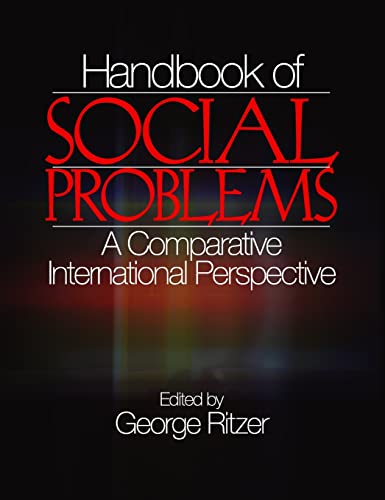Handbook of Social Problems
George Ritzer is Distinguished University Professor at the University of Maryland, where he has also been a Distinguished Scholar-Teacher and won a Teaching Excellence Award. He was awarded the Distinguished Contributions to Teaching Award by the American Sociological Association, an honorary doctorate from LaTrobe University in Australia, and the Robin Williams Lectureship from the Eastern Sociological Society. His best-known work, The McDonaldization of Society (8th ed.), has been read by hundreds of thousands of students over two decades and translated into over a dozen languages. Ritzer is also the editor of McDonaldization: The Reader; and author of other works of critical sociology related to the McDonaldization thesis, including Enchanting a Disenchanted World, The Globalization of Nothing, Expressing America: A Critique of the Global Credit Card Society, as well as a series best-selling social theory textbooks and Globalization: A Basic Text. He is the Editor of the Encyclopedia of Social Theory (2 vols.), the Encyclopedia of Sociology (11 vols.; 2nd edition forthcoming), the Encyclopedia of Globalization (5 vols.), and is Founding Editor of the Journal of Consumer Culture. In 2016 he will publish the second edition of Essentials of Sociology with SAGE. ... Read more Read less
The Handbook of Social Problems provides a unique, broadly comparative perspective on the current state of social problems and deviance in a variety of societies around the world. George Ritzer, gathers a number of leading international sociologists and social theorists to examine the relationship between social problems and a society's level of development and affluence. The essays in this volume focus on four interrelated issues involved in the relationship between social problems and the level of development and affluence: Less developed and less affluent societies are more likely to experience a range of social problems than developed and affluent societies. Affluence causes or at least brings with it a series of social problems that do not exist in less affluent societies. It is only with affluence that certain things can come to be imagined as social problems, such as excessive consumption. The very affluence of a society makes it vulnerable to problems that would not be social problems in poorer societies. The Handbook explores the theory of the weakness of the strong-in other words, strong or wealthy nations may have greater vulnerability to some social problems than less developed or affluent societies. This theory is clearly illustrated in this volume by the aftermath of September 11, 2001depicting the vulnerability of the U.S. to social problems in far-removed corners of the world. In addition, the international and comparative essays in this volume cover other important issues such as the impact of modern technologies on social problems, ecological problems, global inequality, health as a social problem, and much more. The Handbook of Social Problems is a vital resource for students studying on a number of courses across the social sciences and will be an excellent addition to any academic library. ... Read more Read less











